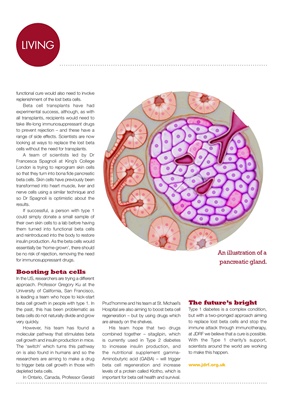
LIVINGLIVING
functional cure would also need to involve
replenishment of the lost beta cells.
Beta cell transplants have had
experimental success, although, as with
all transplants, recipients would need to
take life-long immunosuppressant drugs
to prevent rejection - and these have a
range of side effects. Scientists are now
looking at ways to replace the lost beta
cells without the need for transplants.
A team of scientists led by Dr
Francesca Spagnoli at King's College
London is trying to reprogram skin cells
so that they turn into bona fide pancreatic
beta cells. Skin cells have previously been
transformed into heart muscle, liver and
nerve cells using a similar technique and
so Dr Spagnoli is optimistic about the
results.
If successful, a person with type 1
could simply donate a small sample of
their own skin cells to a lab before having
them turned into functional beta cells
and reintroduced into the body to restore
insulin production. As the beta cells would
essentially be 'home-grown', there should
be no risk of rejection, removing the need
for immunosuppressant drugs.
Boosting beta cells
In the US, researchers are trying a different
approach. Professor Gregory Ku at the
University of California, San Francisco,
is leading a team who hope to kick-start
beta cell growth in people with type 1. In
the past, this has been problematic as
beta cells do not naturally divide and grow
very quickly.
However, his team has found a
molecular pathway that stimulates beta
cell growth and insulin production in mice.
The 'switch' which turns this pathway
on is also found in humans and so the
researchers are aiming to make a drug
to trigger beta cell growth in those with
depleted beta cells.
In Ontario, Canada, Professor Gerald
Prud'homme and his team at St. Michael's
Hospital are also aiming to boost beta cell
regeneration - but by using drugs which
are already on the shelves.
His team hope that two drugs
combined together - sitaglipin, which
is currently used in Type 2 diabetes
to increase insulin production, and
the nutritional supplement gammaAminobutyric acid (GABA) - will trigger
beta cell regeneration and increase
levels of a protein called Klotho, which is
important for beta cell health and survival.
An illustration of a
pancreatic gland.
The future's bright
Type 1 diabetes is a complex condition,
but with a two-pronged approach aiming
to replace lost beta cells and stop the
immune attack through immunotherapy,
at JDRF we believe that a cure is possible.
With the Type 1 charity's support,
scientists around the world are working
to make this happen.
www.jdrf.org.uk